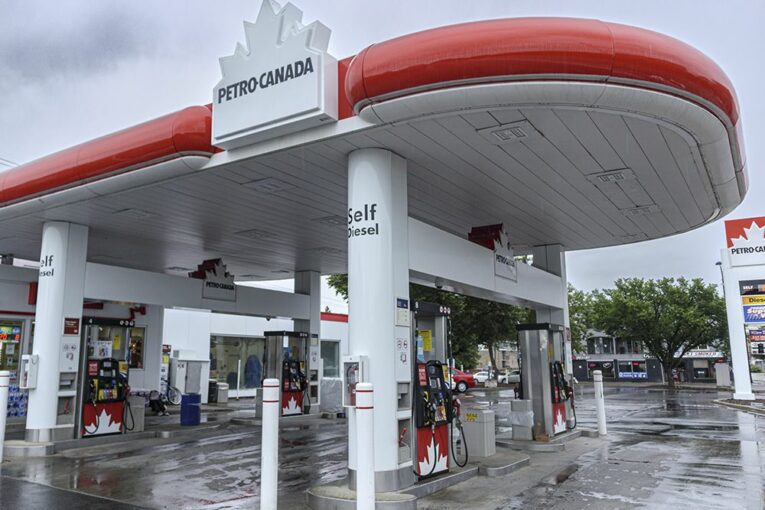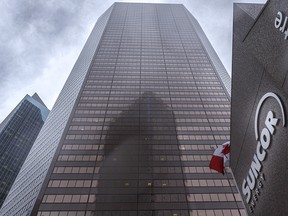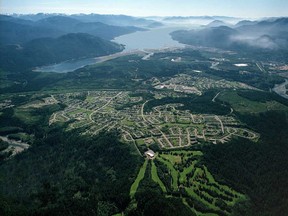
[ad_1]
There are no shortages of pressure points in the oilpatch these days.
On Tuesday, some of those points were put squarely in the spotlight.
At its annual investor day, Suncor Energy announced it will keep its Petro-Canada retail chain, rejecting an earlier call by activist investor Elliott Investment Management to look at off-loading the unit.
The oilsands giant also released its 2023 capital budget, while issuing production guidance for next year that came in below some analysts’ expectations.
Meanwhile, TC Energy is again increasing the price tag on the pivotal Coastal GasLink pipeline that will move western Canadian natural gas to the LNG Canada project for export to Asia.
“They are both rather disappointing,” Laura Lau, chief investment officer with Brompton Group, said of the news.
“Boring is beautiful and surprises are not good, because they tend to be negative surprises.”
For Suncor, Tuesday’s biggest news was the decision to keep its Petro-Canada business and the countrywide chain of nearly 1,600 retail sites.
In July, the Calgary-based company said it would conduct a strategic review of its downstream business as it made an agreement with Elliott Investment Management, an activist U.S. investor pushing for an overhaul at the company. It wanted to see the potential sale of the retail operations to unlock value for shareholders.
As part of an agreement with Elliott, which had previously acquired a 3.4 per cent economic stake in the company, Suncor added three new independent board members.

Interim CEO Kris Smith, who took over from former CEO Mark Little in July, told investors Tuesday that the company’s board weighed the pros and cons of a potential sale.
With advice from independent advisers, Suncor considered the potential sale of the retail operations, holding on to the business, or spinning it out through an initial public offering.
“The board unanimously decided it is in the shareholders’ best long-term interests to retain retail and continue to optimize the network,” Smith said.
“The board views that our Petro-Canada sales and marketing business provides Suncor’s downstream with a competitive advantage that cannot be replicated.”
Based on analysis done by independent external advisers, Smith said the company determined the retail unit’s net value could range between $3.8 billion and $5.7 billion. During the process, 17 strategic and financial parties were invited to submit expressions of interest in the retail business.
The decision comes during a period of change at Suncor and for the downstream sector.
Smith pointed out Suncor expects Canadian gasoline demand could drop by up to 25 per cent by the late 2030s as the popularity of electric vehicles grows. Keeping control of the retail business provides “demand security” for the company’s refineries.
Suncor will optimize the retail network and expand strategic partnerships for the Petro-Canada business as it aims to increase its earnings.
Recommended from Editorial
-

Suncor opts to keep Petro-Canada gas stations in rebuff to activist investor
-

TC Energy sees higher costs for troubled Coastal GasLink pipeline
-

Varcoe: After seven tough years, a comeback is underway for battle-tested drillers
-

Varcoe: Even with crude prices pulling back, M&A action picks up in Canada’s oilpatch with $2.3B deal
Shares in Suncor dipped 1.7 per cent Tuesday to close at $45.43 on the Toronto Stock Exchange.
Lau said the fact the board unanimously backed the strategy appears to signal Elliott Investment is likely on board with the move, although officials with the U.S. investment firm did not comment on the matter.
Rafi Tahmazian, a senior portfolio manager at Canoe Financial, which owns a small stake in Suncor, said it makes strategic sense for the company to take the time and consider its options carefully.
“It’s a smart thing to do, especially given the changes occurring at Suncor — namely, that they are about to put a new chief executive officer in place,” he said.
“Common sense prevailed.”
Analyst Phil Skolnick of Eight Capital agreed some investors didn’t want to see the sale of “one of the crown jewels of the company,” as it wouldn’t address some of the operational matters — including safety issues — that have faced the company.
However, the company’s guidance that it expects total production next year to average about 755,000 barrels of oil equivalent (boe) per day — it also announced about a $5.6-billion capital budget next year — was “disappointing,” Skolnick said.
At TC Energy’s investor day, the energy infrastructure giant said the price tag continues to climb on the Coastal GasLink development, a 670-kilometre pipeline that will ship natural gas from northeast B.C. to LNG Canada’s export terminal at Kitimat, B.C.

In July, TC previously said expenditures on the project had jumped to $11.2 billion from an earlier estimate of $6.6 billion.
TC Energy vice-president Bevin Wirzba said rising costs are hitting the project as it faces labour and contracting pressure while other major projects are being built in British Columbia.
More than 6,300 workers are now working on Coastal GasLink, which has faced fierce protests from opponents to the project.
“We’re seeing significant cost pressures. The labour costs and the shortages of skilled labour are intense . . . Contractor underperformance has been challenging,” Wirzba said.
“We expect a material increase in our project costs and our corresponding funding requirements that TC will have to carry. But we are actively pursuing cost mitigation opportunities.”
The company will update the project’s costs in the new year. TC will seek cost recoveries from some of its contractors, he added.
Shares in TC Energy dropped six per cent to close at $61.26 Tuesday on the Toronto Stock Exchange.
Analyst Matthew Weekes of iA Capital Markets noted other energy infrastructure projects have faced cost increases in the past year during a period of inflation. The Trans Mountain pipeline expansion increased its expected price tag earlier this year by 70 per cent to $21.4 billion.
But this latest increase on Coastal GasLink, coming after July’s higher estimate, “is a bit of a surprise, just given the material cost increase that they already recorded on the project,” he said.
“It leaves a bit of an overhang and uncertainty for what is remaining here as they look to finish it off.”
Chris Varcoe is a Calgary Herald columnist.
[ad_2]
You can read more of the news on source
